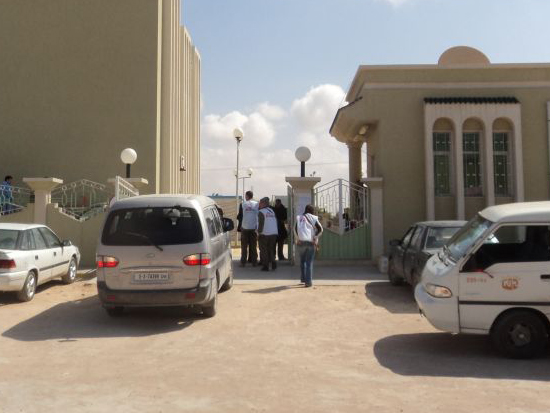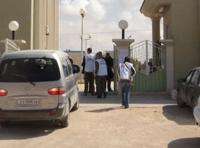The city continues to be bombed, and insecurity prevents the population from accessing medical care.

Libya 2011 © Fouad Ismael Frederic/MSF
An MSF team walks into Kasr Ahmed Hospital in Misrata, where MSF is ramping up medical support.
As bombing attacks continue, Doctors Without Borders/Médecins Sans Frontières (MSF) teams are ramping up medical activities and performing surgery in the northern part of the besieged city of Misrata, Libya.
For two months, government forces and insurgents have battled for control of Misrata. The city continues to be bombed, and insecurity prevents the population from accessing medical care. There is a lack of some medical specialists and nurses, not enough facilities for women in labor, and too few hospital beds for injured patients. In Misrata, the 22-person MSF team delivers medical and surgical care to the wounded in Abbad Hospital and Kasr Ahmed Hospital, and in the Ras Thuba Clinic.
Not Enough Space Nor Staff
Access to medical care has shrunk since a large number of medical facilities have been destroyed or are located too close to the frontlines. In the few facilities that remain operational, there are not sufficient medical staff to provide postoperative care, namely orthopedic surgeons.
“The Libyan medical staff who have been working around the clock for the past seven weeks are exhausted,” said Mego Terzian, head of emergency operations for MSF. “Moreover, the few medical structures that are still operational have no nurses, because most of them were foreigners and these foreigners have left their hospitals.”
On April 28, a nine-person MSF team, consisting of two surgeons, two anesthetists, three nurses, one doctor and one logistician, arrived to lend support to three MSF staff who had been in Misrata for 10 days assessing needs.
Performing Surgery and Increasing Capacity
An MSF surgical team is providing support to Abbad Hospital in the northern part of Misrata. Over the past 48 hours, they’ve helped perform 10 critical surgeries. MSF is also active in the Kasr Ahmed Hospital, which is located in the eastern part of the city. Some 300,000 people have come to the area seeking refuge from the fighting in western Misrata. There, the team is rehabilitating the operating room and increasing the structure’s current intake capacity of 12 to approximately 50 beds. Currently, the few functioning health structures have only about 100 beds for the entire city.
“Because they are afraid that they will not be able to handle a major influx of wounded and because of the lack of human resources, Libyan doctors are forced to send patients back home after two days, even when their conditions have not been completely stabilized,” Terzian said.
MSF also has a presence at the Ras Thuba Clinic, where it is helping pregnant women deliver and performing caesarean sections. In order to help meet the demand, the MSF teams plan to increase operating room capacity to about 50 or 60 beds. An MSF psychologist is providing mental health treatment to Libyan medical personnel who have been working in harsh conditions, exposed to unrelenting stress, since the start of the conflict.
Donating Much-Needed Supplies
In Misrata, water has been in increasingly short supply, with frequent outages and virtually non-stop bombings. In response to the lack of drugs—especially anesthetics—and the lack of medical equipment—such as masks and respiratory filters—MSF has already donated over 25 tons of medical equipment and medicine.
MSF is currently the only independent international medical organization working in Misrata and has a team of 22 staff. The organization has been there since April 18; prior to that, in the first half of April, MSF carried out two medical evacuations by boat, referring around 100 wounded patients to facilities in Tunisia.
MSF Working in Zintan
In Zintan, a town near the border with Tunisia, an MSF team has been working with staff from the local hospital since April 30. Recently, 30 injured people were admitted to the hospital where MSF is assisting the emergency department and providing support by triaging patients and helping to train medical staff. MSF is working in transit and refugee camps, where people are awaiting repatriation or resettlement, and has also deployed mobile clinics along the Tunisian border, focussing on medical and psychological activities.




